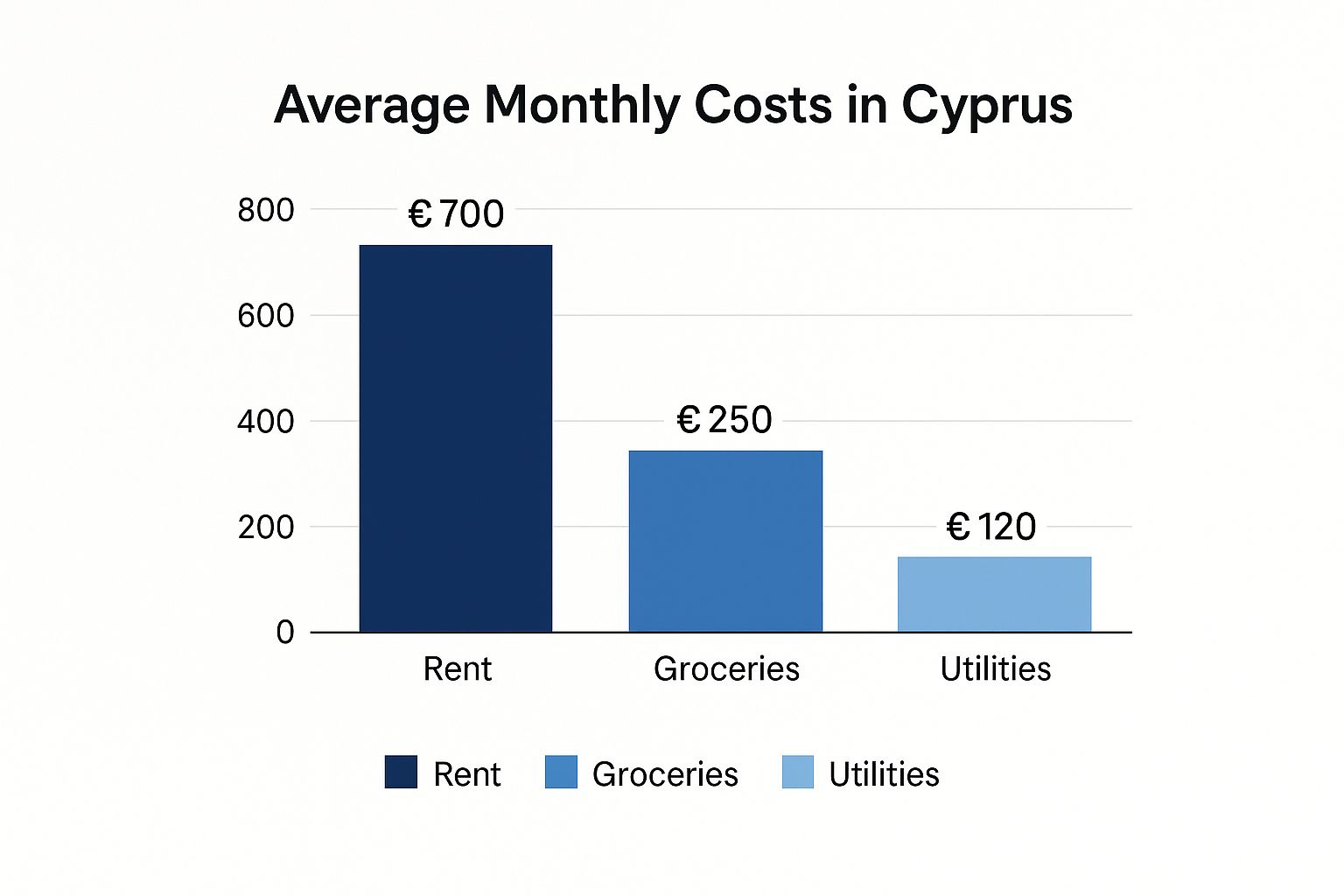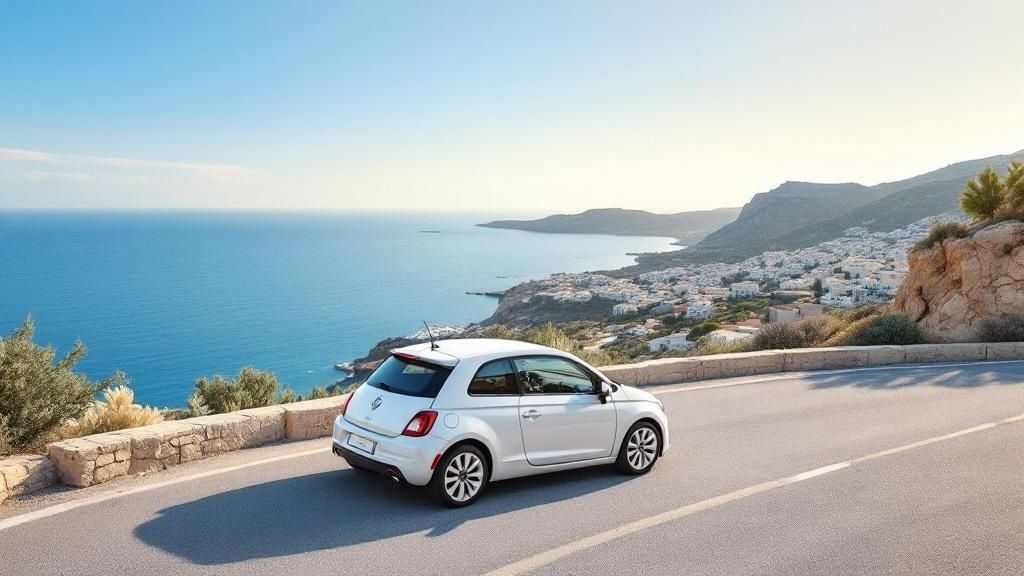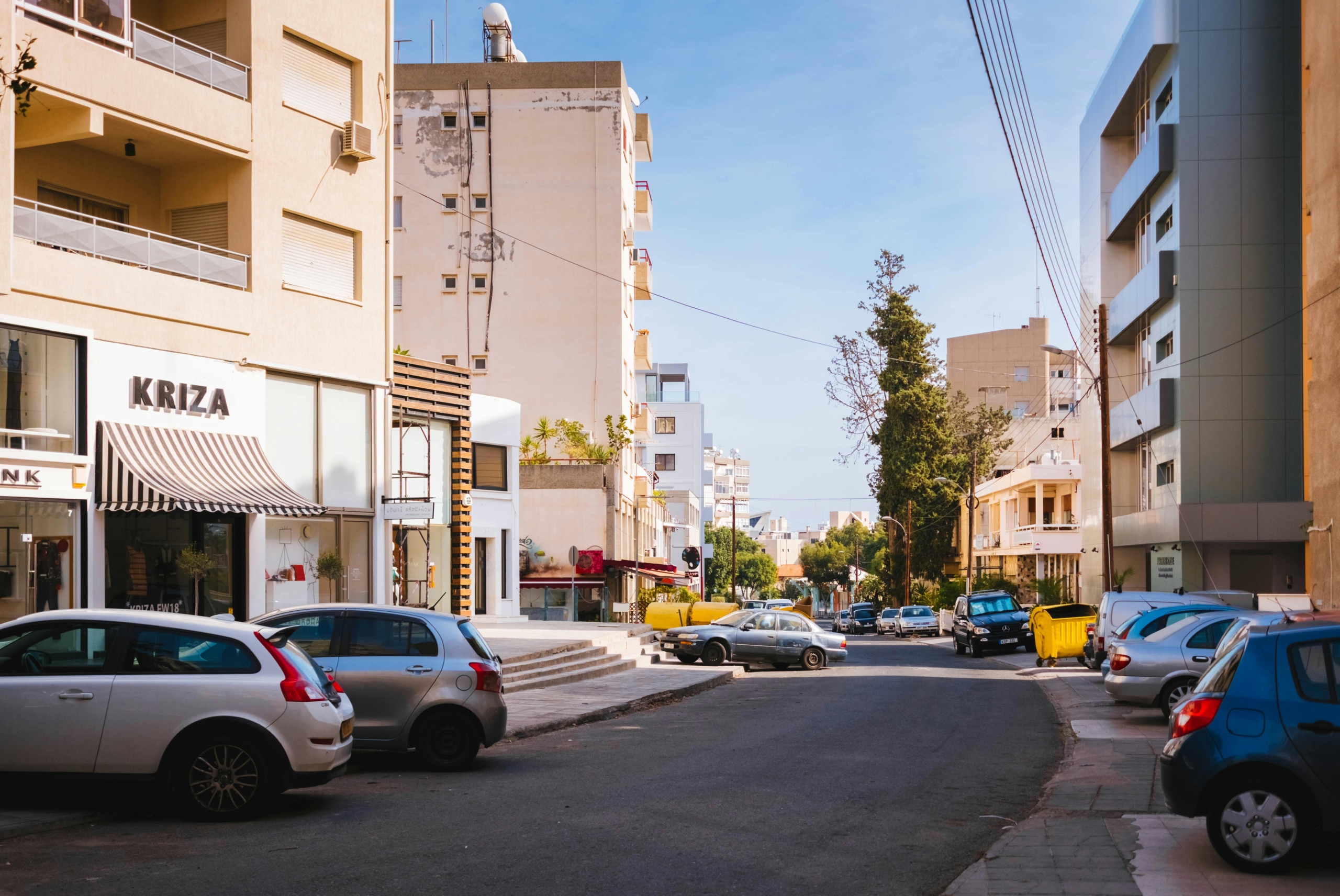Thinking about a move to Cyprus? For discerning international investors, families, and real estate professionals, the island presents a compelling proposition: a high-calibre Mediterranean lifestyle for substantially less than the cost of living in most of Western Europe, the USA, or other prime global markets.
For a single professional, a comfortable, sophisticated lifestyle is achievable for around €1,500 per month. A family of four will typically require a budget between €2,800 and €4,200, contingent on location and personal lifestyle choices. This financial efficiency, coupled with a robust economy, makes the living costs in Cyprus a key driver for relocation and investment. See our latest Cyprus Property For Sale
Understanding the Financial Landscape of Cyprus
Beyond the sun-drenched beaches and ancient history, Cyprus offers a surprisingly balanced economic environment. For affluent investors, real estate agents, and families weighing a move from the USA or Europe, the island is a sophisticated yet affordable alternative. The appeal is simple: reasonable daily expenses, a favourable tax regime, and a robust property market. It all adds up to a sound investment strategy.
Of course, costs are not uniform across the island. Your budget will stretch differently depending on a few key factors:
- Location: Major cities like Limassol, the island’s international business hub, naturally command a higher price tag than the more laid-back coastal city of Paphos. This is a critical factor when assessing potential rental yields versus capital appreciation.
- Lifestyle Choices: The frequency of fine dining, the choice between private or public schooling, and leisure pursuits will significantly impact monthly expenditure.
- Property Type: A sea-view villa will obviously carry a higher cost base than a modern apartment in a quiet suburban neighbourhood, both in purchase price and ongoing maintenance.
This chart provides a snapshot of core monthly expenses, breaking down expenditure on rent, groceries, and utilities.

As illustrated, while housing constitutes the largest portion of expenditure, the refreshingly low cost of daily necessities contributes significantly to the island’s overall affordability and attractive living costs in Cyprus.
City-Specific Cost Variations
To truly grasp the regional nuances, a granular look at the data is essential. The average monthly living costs in Cyprus for a family of four vary considerably by urban centre.
This table offers a comparative overview of estimated monthly expenses for a family of four across Cyprus’s key cities, illustrating the financial variations from one region to another.
| City | Estimated Monthly Cost (EUR) | Key Cost Driver |
|---|---|---|
| Limassol | €4,141 | High demand from international business and premium real estate |
| Nicosia | €3,197 | Capital city dynamics, balanced business and residential costs |
| Larnaca | €2,895 | Growing tourism and affordable housing market |
| Paphos | €2,642 | Popular with retirees and lifestyle buyers, more relaxed market |
These figures underscore the importance of location in financial planning. An investor might target Limassol for its premium rental yields, while a retiree could find Paphos offers an exceptional quality of life for a lower capital outlay.
Understanding these nuances is key for strategic budgeting and ensuring the financial advantages of a Cyprus relocation are fully realised. For a deeper dive, you can explore a comprehensive breakdown of the true cost of living in Cyprus. This will help you align your expenditure with your personal and investment objectives perfectly.
Navigating the Cyprus Property and Rental Market
For anyone considering a move to Cyprus, housing is the most significant line item in their budget and the cornerstone of their living costs. The island’s property market is dynamic, presenting abundant opportunities for both rental income generation and capital appreciation.
Whether your portfolio strategy calls for a sleek city apartment or a coastal villa, understanding local market dynamics is paramount. This is not merely about securing accommodation; it’s about making a strategic financial decision that delivers long-term value.

Unpacking Rental Costs Across the Island
Monthly rental expenditure is a major component of living costs in Cyprus and is heavily influenced by location. The regional differences are stark.
In 2025, a one-bedroom apartment in a prime city centre location commands an average of €943 per month. Relocating just outside the main urban core reduces this to a more manageable €741. For families requiring more space, a three-bedroom apartment in a central location averages €1,731, while a comparable suburban property is closer to €1,382.
These figures explain why cities like Limassol and Nicosia carry a higher overall cost profile compared to quieter towns. This presents a strategic choice: pay a premium for the convenience and prestige of city living, or secure more space for your investment in a calmer, family-oriented suburb.
Analysing Property Purchase Prices
For those contemplating a permanent move or a long-term investment, property acquisition is an equally attractive proposition. Prices have been on a steady upward trajectory, signalling the island’s growing international appeal. Acquiring property here is not just about securing a residence—it’s about wealth creation.
In prime city centres, property prices average around €3,013 per square metre, reflecting high demand and limited supply. Just outside the city centre, the price becomes more accessible, averaging approximately €2,072 per square metre.
This price differential allows for tailored investment strategies:
- City Centre Acquisition: This strategy targets high rental yields from corporate tenants and holds strong potential for capital appreciation.
- Suburban Acquisition: This offers a more accessible entry point, attracting long-term residents and families, ensuring consistent rental demand.
“The consistent demand from both international businesses and lifestyle buyers underpins the strength of the Cypriot property market,” observes Nick Marr, founder of Homesgofast.com. “It’s a mature, transparent environment that offers security and growth potential, which is precisely what our clients from the USA and Europe are seeking.”
Prime Locations and Their Investment Appeal
Certain cities command higher prices for strategic reasons. Limassol is the island’s cosmopolitan business hub, home to multinational corporations, a world-class marina, and luxury retail, all of which drive property values and rental rates upwards.
Nicosia, the capital, offers a stable market underpinned by government employment, university students, and a bustling local economy. Meanwhile, locations such as Paphos and Larnaca offer exceptional value. They are magnets for tourists, retirees, and digital nomads drawn to the beautiful coastlines and a more relaxed pace of life.
For those new to the acquisition process, it is advisable to review some essential tips for first-time home buyers to ensure a smooth transaction.
Ultimately, the rent versus buy decision is contingent on individual circumstances—duration of stay, financial objectives, and desired lifestyle. However, with its strong demand and appreciating property values, the Cyprus market presents a compelling choice for anyone looking to make this Mediterranean island their home or next strategic investment.
Budgeting for Daily Life: Utilities and Groceries
Beyond the capital outlay for property, it is the day-to-day expenses that truly define your cost of living in Cyprus. A firm grasp of recurring costs, such as utilities and groceries, is essential for creating a realistic budget that allows for the full enjoyment of this Mediterranean haven without financial surprises.
For investors, this data is equally vital. It provides a clear picture of the running costs for a rental property, facilitating accurate net yield forecasts and more informed investment decisions.

Managing Your Monthly Utility Bills
While many aspects of Cypriot life are affordable, careful budgeting for utilities—particularly electricity—is advised. This is a crucial detail for anyone planning a long-term stay. The island’s reliance on imported fuel means electricity costs in Cyprus are among the highest in the EU.
This becomes most apparent during the long, hot summers from June to September, when air conditioning transitions from a luxury to a necessity, causing a noticeable spike in monthly bills. To see how these figures compare, you can discover more insights about utility costs in Cyprus.
A typical monthly utility bill for a standard 85m² apartment—covering electricity, heating, cooling, water, and refuse collection—will usually fall between €150 to €250. This can climb higher for larger properties or during peak summer months.
Thankfully, other essential services are much more reasonably priced:
- Internet: High-speed broadband is readily available, with most monthly plans costing between €30 and €50, depending on the required speed.
- Mobile Phone Plans: Competitive mobile plans with ample data typically cost between €20 to €40 per month.
The Cost of Groceries and Dining
Food is another major component of any budget, and here, Cyprus truly excels. The island is blessed with an incredible abundance of fresh, locally grown produce year-round.
One quickly learns that shopping at local farmers’ markets or smaller family-run grocers is significantly more budget-friendly than relying solely on large supermarket chains like Alphamega or Lidl. A single person can eat very well on a grocery budget of around €250–€350 per month, while a family of four should plan for approximately €600–€800.
To provide a better feel for prices, here’s a sample of what you might pay for everyday items:
- Milk (1 litre): €1.50
- Loaf of Fresh White Bread: €1.70
- Local Cheese (1kg): €12.00
- Chicken Fillets (1kg): €8.50
- Apples (1kg): €2.20
- Tomatoes (1kg): €2.50
- Bottle of Mid-Range Wine: €7.00
This combination of higher utility bills and very reasonable food costs creates a unique financial balance. By being mindful of energy consumption and embracing local food markets, one can easily manage daily expenditure and fully absorb the incredible lifestyle the island has to offer.
Understanding Transportation and Commuting Costs
Mobility is a significant component of living costs in Cyprus, shaping both daily budgets and strategic property investment choices. Despite the island’s relatively small size, understanding the transport infrastructure is key to managing expenses effectively.
Whether you are a professional commuting between cities or an investor scouting rental locations, a solid grasp of mobility costs is essential.

Unlike many European countries, Cyprus lacks a rail or metro system. This fact places the focus squarely on road travel, making a private car the preferred mode of transport for most residents navigating the island.
The Dynamics of Private Car Ownership
For most residents, a car is less a luxury than a necessity, particularly for those living outside the main hubs of Nicosia or Limassol. This convenience, however, comes with a clear set of costs that must be factored into any comprehensive budget.
The initial acquisition price of a vehicle can vary significantly. A reliable used economy car can be sourced for between €4,000 and €7,000, representing an accessible entry point. Newer models or luxury brands are priced in line with European standards.
However, the sticker price is just the beginning. Several ongoing costs constitute the true price of car ownership:
- Petrol: Prices fluctuate with the global market, but generally range between €1.45 and €1.70 per litre.
- Annual Insurance: Comprehensive car insurance is mandatory. Annual premiums typically fall between €300 and €600, depending on the vehicle and driving history.
- Maintenance and Road Tax: While smaller costs, regular servicing and the yearly road tax are essential expenses to include in financial planning.
Public Transport as a Cost-Effective Alternative
While private cars dominate, public transport offers a viable and highly affordable option for intra-city travel. The bus network is the primary public system, with regular services operating in urban areas and connecting major towns.
For daily commuters, a monthly bus pass is an excellent value, typically costing between €40 and €50. A single one-way ticket costs just €1.50 to €2.00, making it a logical choice for occasional trips. Taxis are also widely available, with a short cross-town journey costing approximately €8 to €12.
The beauty of Cyprus’s modern road network is that it keeps even the quieter, more scenic villages well-connected to business hubs. This really opens up the investment field beyond just city-centre apartments, attracting people who want that perfect blend of lifestyle and convenience.
Strategic Location and Commuting
The island’s excellent motorway system makes inter-city travel efficient. The journey from Limassol to Nicosia, or Larnaca to Paphos, can be completed in under an hour. This allows professionals to reside in one city and work in another without facing an arduous commute.
This connectivity is a significant advantage for property investors. A well-located suburban villa can be just as attractive to renters as an apartment in the city centre. For those managing rental properties, maintaining them in prime condition is non-negotiable; it is worth understanding why you should hire a professional for end-of-tenancy cleaning to protect your asset’s value.
Ultimately, effective management of the living costs in Cyprus involves balancing the convenience of private car ownership with the affordability of public transport. By tailoring your approach to your lifestyle and location, transport costs can be kept predictable and entirely manageable.
Planning for Healthcare and International Education
For international families and investors evaluating a potential relocation, the quality and cost of healthcare and education are non-negotiable factors. Cyprus excels on both fronts, boasting a sophisticated two-tiered healthcare system and a strong network of world-class international schools—both critical components when calculating the real cost of living on the island.
Accurate financial planning for these significant expenses is essential for long-term stability and ensuring a move aligns with both lifestyle aspirations and budgetary realities.
Navigating the Cypriot Healthcare System
Cyprus offers a reassuringly high standard of medical care through a dual system, providing residents with both flexibility and choice. The public option, GESY (General Healthcare System), is available to all permanent residents and EU citizens. It provides comprehensive coverage, with a visit to a general practitioner often being free or requiring only a small co-payment of around €6.
However, the majority of international professionals and their families opt for the private healthcare sector. This network of modern hospitals and specialised clinics is known for its minimal waiting times, English-speaking staff, and access to the latest medical technologies.
To access the private system, robust health insurance is essential. A family plan from a reputable international provider will typically cost between €1,500 and €4,000 annually, depending on the level of coverage required.
Here is a brief overview of typical out-of-pocket costs for private care:
- Private Doctor Consultation: A standard visit to a general practitioner costs between €30 and €60.
- Specialist Visit: A consultation with a specialist typically ranges from €40 to €80.
- Dental Services: Routine care is very reasonably priced. A standard dental cleaning, for example, is usually in the €50 to €80 range.
This structure allows families to select the level of service that fits their needs and budget, making healthcare a predictable and manageable expense.
Investing in International Education
For expatriate families, access to top-tier schooling is paramount, and Cyprus is home to an impressive array of private international schools. Most of these institutions follow either the British curriculum (IGCSEs and A-Levels) or the International Baccalaureate (IB) programme, ensuring a seamless educational transition for children from the USA, UK, and other parts of Europe.
While fees represent a significant portion of a family’s budget, they are an investment in a child’s future. When planning, it is vital to understand the various education fees, as costs often extend beyond basic tuition.
“The availability of high-calibre, English-speaking international schools is a major drawcard for our clients,” Nick Marr of EuropeanProperty.com notes. “It removes a significant barrier to relocation and solidifies Cyprus’s reputation as a premier destination for international business and family life.”
Tuition costs vary depending on the school’s prestige, location, and the child’s age. To provide a clearer financial picture, here are typical annual fee ranges:
- Primary School (Years 1-6): Annual tuition can be expected to be between €3,000 and €7,000.
- Secondary School (Years 7-13): Fees for older students are higher, usually ranging from €6,000 to €12,000 per year.
These schools offer outstanding facilities, small class sizes, and a diverse, multicultural student body. It is also worth remembering that older students have unique accommodation needs; our guide on 10 things students want from their accommodation offers valuable insights for families with university-aged children. By budgeting for these educational costs upfront, families can confidently plan for a long and successful future on the island.
Embracing the Mediterranean Lifestyle on a Budget
One of the primary attractions of Cyprus is a lifestyle that perfectly balances relaxed Mediterranean charm with sophisticated leisure. For discerning buyers, understanding the real-world costs of this lifestyle reveals just how attainable it is. While the overall living costs in Cyprus are highly competitive, the value proposition in dining and leisure is where the island truly excels.
The culinary scene is integral to the island’s culture, with options for every taste and budget. An authentic and high-quality meal for two at a family-run taverna can be enjoyed for as little as €20 to €30. For a more polished evening, a three-course dinner at a mid-range restaurant in a bustling city or marina will typically cost between €40 and €70.
Curating Your Leisure and Entertainment Expenses
Beyond the exceptional food, maintaining a rich and active social life is surprisingly affordable. The key is to understand the expected costs for discretionary spending.
Here’s a brief overview of what common leisure activities cost:
- Fitness and Wellness: A monthly gym membership in a major city, providing access to modern facilities, ranges from €40 to €60.
- Cinema and Culture: A cinema ticket for a new film release costs approximately €8 to €10.
- Coffee Culture: A cappuccino at a local café—a cornerstone of Cypriot social life—is a simple pleasure, priced at a reasonable €3 to €4.
These modest costs demonstrate that a vibrant social life is not a luxury here; it is a manageable and integral part of one’s monthly budget.
Capitalising on Natural Amenities
A significant advantage of living in Cyprus is the abundance of free or low-cost natural attractions. The island’s stunning public beaches, scenic hiking trails through the Troodos Mountains, and charming, historic villages offer endless opportunities for recreation without significant expenditure.
For those seeking a touch of luxury, private beach clubs offer day passes and seasonal memberships. For the more adventurous, water sports such as paddleboarding or kayaking are readily available along the coast at very reasonable rental prices.
The lifestyle in Cyprus presents an incredible return on investment. It’s not just about the financial numbers; it’s about the quality of experiences you can afford. The ability to enjoy world-class dining, pristine beaches, and a vibrant social scene at a fraction of the cost in other prime global locations is a powerful motivator for our international clients.
This blend of affordable luxury and accessible leisure makes the island exceptionally appealing. It empowers residents to fully embrace the coveted Mediterranean lifestyle, making the overall living costs in Cyprus an unbeatable proposition for those seeking both financial prudence and a higher quality of life.
Your Cyprus Cost of Living Questions Answered
When planning an international move, the financials are paramount. Understanding the day-to-day costs is key to making an informed decision. Here are answers to some of the most common questions from prospective residents and investors considering Cyprus.
What is a good salary to live comfortably in Cyprus?
This is a critical question. For a single professional, a monthly salary of around €1,500 serves as a solid benchmark. This should comfortably cover rent, bills, and groceries, while still allowing ample funds to enjoy the island’s lifestyle without meticulous penny-watching.
For a family of four, a household income closer to €3,000 to €3,500 per month is advisable. This budget provides more flexibility, particularly when factoring in expenses such as private or international schooling. It facilitates an excellent quality of life, accommodating regular dining out, weekend excursions, and savings.
How do the living costs in Cyprus compare to the UK?
Your capital will go significantly further here. Overall, the cost of living in Cyprus is noticeably lower than in the United Kingdom. On average, you can expect consumer prices, including rent, to be 20-30% lower than in most major UK cities.
The most significant savings are found in:
- Rent and Property: This is a major differentiator. You secure far more value for your money, whether renting or buying.
- Dining Out and Groceries: Fresh, local produce is abundant and affordable. A meal at a local taverna is exceptionally good value.
- Council Tax: It is non-existent. Cyprus has abolished its annual immovable property tax, which represents a substantial saving compared to the UK’s council tax bills.
It is important to note, however, that utilities such as electricity can be more expensive, particularly during the hot summer months. This should be factored into any budget.
Is it possible to live in Cyprus on a tight budget?
Absolutely. A large income is not a prerequisite for enjoying a fantastic Mediterranean lifestyle. The key is to reside outside the main corporate hub of Limassol, which is typically the most expensive city.
Consider locations like Paphos or Larnaca. They offer a much more affordable cost of living while still providing beautiful coastlines, excellent amenities, and vibrant communities. To make a modest budget work effectively, adopt local habits:
- Shop at local markets for fresh produce.
- Utilise public transport systems within the cities.
- Rent an apartment just outside the main tourist centres.
Are there any hidden taxes to be aware of?
Cyprus is known for its transparent and attractive tax system, but it is prudent to understand the full landscape. Beyond standard income tax, a few other taxes apply:
- Special Defence Contribution (SDC): This is a tax on dividend and interest income, but it typically only applies to tax residents who are also domiciled in Cyprus.
- Capital Gains Tax: This is levied on profits from the sale of property located in Cyprus.
- VAT: The standard rate is 19%, with reduced rates on certain goods and services.
Engaging a local tax advisor upon arrival is always recommended. They can ensure your affairs are structured correctly and that you are taking full advantage of the local tax legislation.
At HomesGoFast.com, we have been connecting international buyers with their dream properties in Cyprus and over 50 other countries since 2002. Whether you are seeking a luxury villa with a sea view or a strategic investment property, our platform has the listings and expertise to guide your search.
Explore our extensive portfolio of properties for sale in Cyprus today.
About Homesgofast.com
HomesGoFast.com is a leading international property website, established in 2002, helping homeowners, real estate agents, and developers reach overseas buyers. Featuring thousands of listings from over 50 countries, the platform connects global property seekers with homes, apartments, villas, and investment opportunities worldwide.
Looking for expert mortgage guidance? Get international property mortgage advice here:
👉 https://homesgofast.com/mortgages-overseas/
Explore more overseas homes for sale at our global partner site:
👉 https://homesgofast.com/overseas-property/
Looking to sell real estate to foreign buyers – Sell Cyprus property




